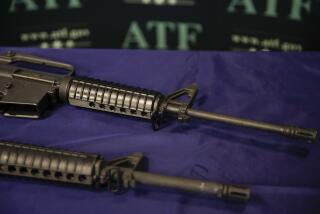Start-Up Acquires Smith & Wesson
- Share via
Smith & Wesson, a slumping icon of the American firearms industry, has been sold by its British owner for $15 million to a start-up developer of gun safety devices, Saf-T-Hammer Corp. of Scottsdale, Ariz.
The nearly 150-year-old company is being jettisoned by Tomkins, which purchased the legendary gun maker in 1987 for more than $100 million. The low sale price reflects Smith & Wesson’s continuing exposure to litigation over gun violence in U.S. cities, as well as sales losses from a boycott by gun-rights groups.
In addition to the $15-million purchase price, Saf-T-Hammer took over a $30-million note that is payable to Tomkins in 10 years.
Saf-T-Hammer, which was established in 1998, makes safety devices to prevent accidental shootings and unauthorized use of guns. Company Chief Executive Mitchell Saltz said the acquisition will allow Saf-T-Hammer to utilize Smith & Wesson’s extensive sales force in distributing its trigger locks, gun safes and other products.
In addition, he said, Saf-T-Hammer intends to incorporate its trigger-locking device on Smith & Wesson firearms, which will add about $12 to the cost of a gun.
“It’s the ant eating the elephant, you know,” Saltz said. “A little 2-year-old start-up” buying a “legendary company doesn’t happen every day.”
Founded in 1852 by Horace Smith and Daniel B. Wesson, the Springfield, Mass., gun maker is still among the highest-volume U.S. handgun producers. But its sales slipped last year to about $50 million, far below its sales record of $150 million in 1995.
The company last fall laid off 125 workers, dropping its work force to about 670. It had more than 1,000 employees just a few years ago.
Part of last year’s sales decline reflected the ire of gun-rights groups over the company’s decision to break ranks with other manufacturers and reach an accord with the Clinton administration.
In March 2000, the company agreed to make changes in its marketing practices and incorporate safety features in its guns. In return, federal authorities agreed to leave the company out of a proposed lawsuit by hundreds of public housing authorities. They also agreed to ask law enforcement agencies to give Smith & Wesson special consideration when ordering firearms.
But the public housing lawsuit never materialized. And only one of the cities involved in anti-gun lawsuits--Boston--has dismissed Smith & Wesson from its case.
Eight other cases have been dismissed by trial or appellate courts, but about 20 suits still are pending against gun manufacturers, including Smith & Wesson.
Three of the suits are in California, where the city and county of Los Angeles and the cities of Compton, West Hollywood, San Francisco and Sacramento are among the plaintiffs.
Ken Jorgensen, Smith & Wesson’s director of marketing and communication, said being owned again by an American firm will be “a big positive. . . . I think it’s good for morale here, [and] it’s going to be good for business.”
Saf-T-Hammer will continue to operate Smith & Wesson’s manufacturing plants in Springfield and in Houlton, Maine, though Jorgensen said a small cutback in employment is probable in the coming days.
Saf-T-Hammer shares, traded over the counter, fell 25 cents to close at $1.15 Monday.
*
Times wire services were used in compiling this report.
More to Read
Inside the business of entertainment
The Wide Shot brings you news, analysis and insights on everything from streaming wars to production — and what it all means for the future.
You may occasionally receive promotional content from the Los Angeles Times.










